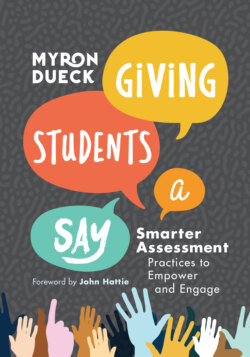Читать книгу Giving Students a Say - Myron Dueck - Страница 26
На сайте Литреса книга снята с продажи.
Actions (Verbs) and Content (Nouns)
ОглавлениеWhen sharing and codesigning learning targets with students, it will be helpful for them to understand that a target typically consists of two important elements. As Krathwohl (2002) states: "Objectives that describe intended learning outcomes as the result of instruction are usually framed in terms of (a) some subject matter content and (b) a description of what is to be done with or to that content" (p. 213).
Krathwohl's observation alerts us to the fact that when constructing effective learning targets, we need to understand the purpose of verbs (actions) and nouns (content/object). The verb will largely determine the cognitive level of the learning outcome, whereas the noun (content/object) will determine the knowledge dimension. Consider the following example from Krathwohl: "The student shall remember the law of supply and demand in economics." The verb remember establishes the level of cognitive demand, whereas the noun phrase "the law of supply and demand in economics" establishes the knowledge dimension. To be clear, both are crucial to the learning and assessment process, and we should be cautious when we're tempted to say one is more important than the other. That said, with many recent curriculum changes throughout the world, learning standards today are populated with verbs that often require a higher cognitive demand than the word remember. Verbs such as evaluate, analyze, determine, argue, and create are just a few that are used to establish the action in contemporary standards.
The focus on verbs is critical when designing learning targets with our students. If we are going to articulate student-friendly learning targets, and later establish clear performance measures, build effective assessments for self-evaluation, and ultimately design student self-reporting structures, let's keep in mind that verbs should be actionable, achievable, and not shrouded in the "you have it or you don't" world of nouns. Furthermore, teachers are reminded that it's OK to question whether their instruction and assessment match the verb phrase of their target. As grade 9 science teacher Helen Carelse commented,
My learning standard read, "Apply scientific knowledge and understanding to solve problems in unfamiliar situations." I have realized I needed to carefully examine what I am doing in my classroom to make sure I was providing enough "practice" for the students to improve at this skill. Easier said than done! (personal communication, February 4, 2019)
